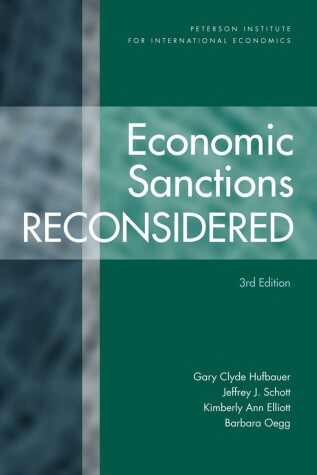Now available directly from: IIE11 Dupont Circle, NWWashington, DC 20036Tel: (202) 328-9000Economic sanctions have become an increasingly central tool of United States foreign policy. Recently, doubts have been raised-both at home and abroad-as to whether sanctions are effective in meeting their avowed foreign policy objectives, or even their domestic policy goals. These concerns, influenced primarily by recent experience with the Soviet grain embargo and pipeline sanctions, have rekindled congressional debate on the use of economic sanctions and have spawned legislative proposals to constrict recourse to such measures in the future.To address these proposals, this book examines almost a hundred cases where sanctions have been used since World War I, Among them are the League of Nations against Italy in 1935, the Western Alliance against Germany and Japan in the Second World War, the USSR against Yugoslavia in 1948-1955, the United Nations, against Rhodesia and South Africa, the United States against Britain and France over the Suez Canal crisis in 1956, the Arab nations of the Organization of Petroleum Exporting Countries against the United States in 1973, and the recent round of cases mounted by the United States against the Soviet Union.The book analyzes why sanctions are deployed, what sanctions can achieve, and the costs to both target and sender countries. It then applies lessons from historical experience to the current policy debate, and recommends guidelines for the future use of economic sanctions in pursuit of foreign policy objectives.
- ISBN10 0881322687
- ISBN13 9780881322682
- Publish Date November 2002 (first published 18 July 1985)
- Publish Status Active
- Out of Print 5 January 2008
- Publish Country US
- Publisher The Peterson Institute for International Economics
- Imprint Institute for International Economics,U.S.
- Edition 3rd Revised edition
- Pages 350
- Language English
